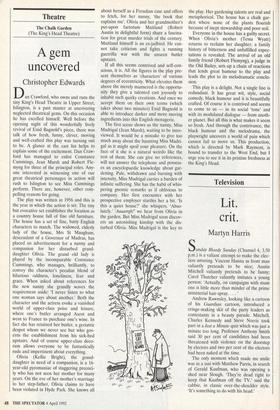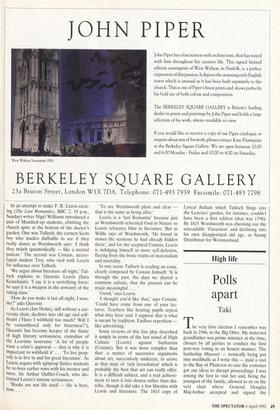Television
Lit.
crit.
Martyn Harris
Sunday Bloody Sunday (Channel 4, 3.50 p.m.) is a valiant attempt to make the elec- tion amusing. Vincent Hanna as front man valiantly pretends to be nice; Austin Mitchell valiantly pretends to be funny; Carol Thatcher valiantly imitates a young person: 'Actually, on campaigns with mum one is little more than minder of the prime ministerial hair-spray.... '
Andrew Rawnsley, looking like a cartoon of his Guardian cartoon, introduced a cringe-making skit of the party leaders as contestants in a beauty parade. Mitchell, Charles Kennedy and Steve Norris took part in a Just a Minute quiz which was just a minute too long. Professor Anthony Smith said 30 per cent of candidates had been threatened with violence on the doorstep by electors and two per cent of the electors had been naked at the time.
The only moment which made me smile was in a taxi with Matthew Parris, in search of Gerald Kaufman, who was opening a shed near Slough. 'They're dead right to keep that Kaufman off the TV.' said the cabbie, in classic over-the-shoulder style. `It's something to do with his head.'
In an attempt to make F. R. Leavis excit- ing (The Last Romantics, BBC 2, 10 p.m., Sunday) writer Nigel Williams introduced a pair of Mandied-up students, climbing the church spire at the bottom of the doctor's garden. One was Tulloch, the earnest Scots boy who studies daffodils to see if they really dance as Wordsworth says: 'I think they twitch spasmodically — like a mental patient.' The second was Costain, stereo- typed student Trot, who vied with Leavis for influence over Tulloch.
`We argue about literature all night,' Tul- loch explains to Queenie Leavis (Sara Kestelman). 'I say it is a revivifying force; he says it is a weapon in the armoury of the ruling class.'
'How do you make it last all night, I won- der?' asks Queenie.
As Leavis (Ian Holm), still without a uni- versity chair, declines into old age and self- doubt (`Have I withheld too much? Will I be remembered only for bitterness?'), Queenie has become keeper of the flame of high literary seriousness, custodian of the Leavisite nostrums: 'A lot of people want a critic's approval — that is why it is important to withhold it' ... 'To live prop- erly is to live in and for great literature'. As Leavis argues with agitprop Sixties students he re-lives earlier rows with his mentor and tutor, Sir Arthur Quiller-Couch, who dis- trusted Leavis's intense seriousness.
`Books are not life itself — life is here, now.. 'To see Wordsworth plain and clear that is the same as being alive.'
Leavis is a 'last Romantic' because just as Wordsworth relocated God in Nature so Leavis relocates Him in literature. But as Wilde says of Wordsworth, 'He found in stones the sermons he had already hidden there', and for the sceptical Costain, Leavis is indulging himself in more self-delusion, fleeing from the brute truths of materialism and mortality.
In one scene Tulloch is reading an essay, clearly composed by Costain himself: 'It is through the past, the days we shared a common culture, that the present can be made meaningful. ... '
`Good,' says Leavis.
`I thought you'd like that,' says Costain. `Could have come from one of your lec- tures. Teachers like hearing pupils repeat what they have said. I suppose that is what is meant by tradition. Endless repetition like advertising.'
Some reviews of this fine play described it simply in terms of the last stand of High Culture (Leavis) against barbarism (Costain). But it was more complex than that: a matter of successive arguments about art, successively undercut, to arrive at that state of 'rich irresolution' which is probably the best that art can really offer. It is a difficult subject, and a real achieve- ment to turn it into drama rather than dia- tribe, though it did take a few liberties with Leavis and literature. The 1815 copy of
Lyrical Ballads which Tulloch flings into the Leavises' garden, for instance, couldn't have been a first edition (that was 1798). By 1815 Wordsworth was churning out the unreadable 'Excursion' and declining into his own disappointed old age, as Stamp Distributor for Westmorland.



























































 Previous page
Previous page